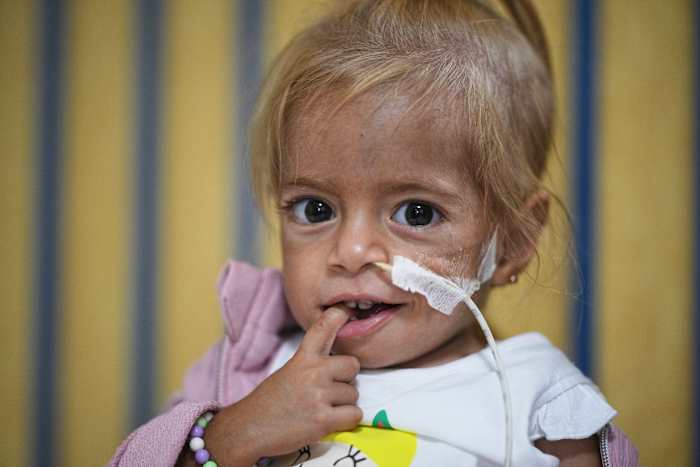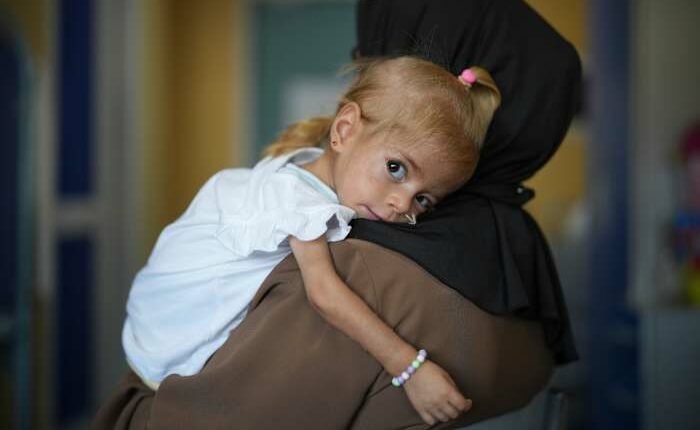Share this @internewscast.com

NAPLES – Since coming to Italy from Gaza in a weakened state, young Shamm Qudeih has marked her second birthday and gained weight with the help of a specially formulated porridge. This is a positive development for doctors addressing her acute malnutrition, exacerbated by a hereditary metabolic disorder.
Not long ago, the little girl was extremely underweight, clutching her mother in a Gaza hospital after months of scarcity. Due to an Israeli blockade aimed at putting pressure on the Hamas group to free captives, she couldn’t get the proper nutrition and care. Then she was taken to Italy for medical aid, along with six other Palestinian children.
A poignant photograph by Associated Press freelance journalist Mariam Dagga captured Shamm, frail and clinging to her mother, her ribs starkly visible. This was taken shortly before her departure from Gaza on Aug. 13. Tragically, this became one of Dagga’s final works; she was among 22 individuals killed in an Israeli strike on that same hospital in Gaza on Aug. 25.
Over half a million Gaza residents, a significant portion of the population, are facing severe hunger due to the blockade and ongoing military actions, as reported by a leading global organization on hunger issues. Gaza City, in particular, is experiencing famine.
Toddler perks up
This week, Shamm was seen sitting up, engaged, in a hospital crib in Naples, her delicate blonde hair styled in a ponytail. Wearing a T-shirt with the word “cute,” her eyes shone brightly as her sister and mother called out to her, prompting a cheerful smile.
When Shamm arrived in Italy, she weighed approximately 4 kilograms (9 pounds), in a precarious and difficult medical condition, explained Dr. Daniele de Brasi, a pediatric specialist in genetic diseases at Santobono Pausilipon Children’s Hospital in Naples.
She now weighs 5.5 kilograms (just over 12 pounds), which is still no more than half of the median weight for a child of her age, de Brasi said.
The doctor said “a big part” of her undernourishment was due to a genetic metabolic disease called glycogen storage disease, which interferes with the absorption of nutrients, particularly carbohydrates, and can cause muscle weakness and impede growth. The condition is primarily managed through a high-carbohydrate diet.
So far, “We are very satisfied with her progress,’’ de Brasi said.
A mother’s struggle
Shamm suffered from malnutrition from birth, just weeks before the Oct. 7, 2023, attack in which Hamas-led militants killed around 1,200 people, mostly civilians, and took another 251 hostage. Forty-eight hostages are still in Gaza, around 20 of them believed to be alive, after most of the rest were returned in ceasefires or other deals.
Israel responded with an offensive that Gaza health officials say has killed more than 64,000 Palestinians in nearly two years of fighting. The Gaza Health Ministry, which is part of the Hamas-run government and run by medical professionals, does not say how many were civilians or combatants but that around half of those killed were women and children.
The family was forced to move more than a dozen times, and Shamm’s mother, Islam, struggled to get her proper medical care, visiting many hospitals and clinics. Doctors suspected the rare condition but could not test for it, much less treat it properly. They sometimes offered antibiotics.
“It became worse as a result of the lack of food, treatment and possibilities,” Islam said in an interview with Shamm resting on her shoulder. “We have been displaced maybe about 15 times, from tent to tent. We walked long distances and, along the way, it was hot, and the sun was hitting us.”
For a while, doctors administered a special formula, but Shamm would not take it, having lost the habit of drinking milk after supplies in Gaza became scarce.
The U.N. warned last month that starvation and malnutrition in Gaza are at the highest levels since the war began. Nearly 12,000 children under 5 were found to have acute malnutrition in July — including more than 2,500 with severe malnutrition, the most dangerous level. The World Health Organization says the numbers are likely an undercount.
A final photograph in Gaza
It was at Nasser Hospital in the southern Gaza city of Khan Younis that Dagga photographed Shamm for the last time on Aug. 9. During the visit, Shamm cried in pain in her hospital bed. Her arms, legs and ribs were skeletal, her belly swollen.
Islam had gone to school with Dagga, who visited the hospital, and remembered her fondly.
“She was always coming to the hospital to check on me and Shamm,” right up to the day of their departure for Italy, Islam said. “She stayed until the last step of the stairs to say goodbye to me.”
After arriving in Italy, Islam learned that Dagga had died in an attack that killed four other journalists.
“I was upset when I heard and knew that she had died,” Islam said.
Ongoing treatment
Shamm is among 181 Palestinian children being treated in Italy, according to the Italian Foreign Ministry. About one-third of those have arrived since March, when Israel ended a ceasefire with Hamas and imposed the 2 1/2 month blockade on all imports, including food and medicine.
Israel denies there is starvation in Gaza, despite accounts to the contrary from witnesses, U.N. agencies and experts. It says it allowed enough aid to enter before and after the tightened blockade and has allowed increased supplies in recent weeks.
In Naples, Shamm now has a feeding tube in her nose to ensure she gets the right mix of nutrients overnight. Doctors aim to remove the tube in about a month. During the day, she is free to eat solid food, including meat and fish. A cornerstone of her diet is the carbohydrate-rich porridge.
Her current intake is around 500 calories a day, which doctors are gradually increasing.
“In these cases, growing too fast can cause problems,” de Brasi said.
Her 10-year-old sister, Judi, was brought to Italy as an accompanying family member, and doctors began treating her after noting that she was at least three or four kilograms underweight, de Brasi said. She has gained two kilograms (nearly 5 pounds) and is in good condition.
With both daughters improving, Shamm’s mother is allowing herself to experience relief. But it is too soon to think about going back to Gaza, where Shamm’s father is.
“Now there is no way to go back, as long as the war is going on. There are no possibilities for my daughters,’’ she said.
___
Barry reported from Milan.
Copyright 2025 The Associated Press. All rights reserved. This material may not be published, broadcast, rewritten or redistributed without permission.










